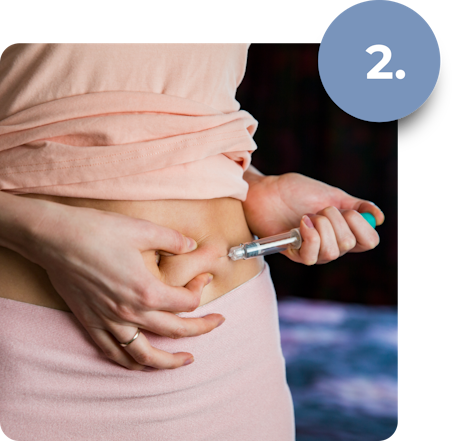IVF Treatment Timeline
Wondering what to expect during IVF?
Our board-certified fertility and reproductive experts customize each round of IVF to fit each patient and give them the best chance of success.
Explore a typical IVF cycle at our fertility clinic serving Omaha and Lincoln, NE.
Day 1
IVF Preparation
Your in vitro fertilization (IVF) cycle officially begins on the first day of your menstrual cycle. At this time, baseline testing is performed at our fertility clinic offices in Omaha or Lincoln. This includes ultrasounds and blood tests. This step of the IVF process allows your doctors to customize your medications, look at the lining of your uterus, and check your ovaries for cysts.
Testing and ultrasounds also help your doctor determine if your uterus and ovaries are ready for the next step of treatment. If your body is not ready for the IVF cycle, you may skip a cycle and start the IVF process on your next menstruation.


Days 2-14
Ovarian Stimulation
During ovarian stimulation, you will take injections to stimulate follicle growth and mature multiple eggs. These medications are taken for 8-12 days. You will come to our Omaha or Lincoln office every other day so we can monitor the follicles for growth. Your doctor will make adjustments to your medications as needed.
Ovarian stimulation includes subcutaneous injections, which means the needle goes just below the skin. Your care team will show you how to do these injections at home.
Day 14
Ovulation Induction and Egg Retrieval
Once the eggs are mature, you will take a trigger shot of hCG, also known as the pregnancy hormone. This will induce ovulation within 36 hours.
Egg retrieval is the next step of treatment. You will be given sedation to keep you comfortable. Your doctor will then insert a thin needle through the vaginal wall and extract the eggs from the ovaries.


Day 14-18
Fertilization
Once the eggs are retrieved, they are given a few days to mature and are then fertilized in our lab using sperm from the father or sperm donor. This process is called embryo culture. We will monitor the fertilized egg for embryo development, which takes about 3-5 days. If you wish to have preimplantation genetic testing done, this is performed once the eggs reach the embryonic stage.
Day 18-19
Embryo Transfer
Your doctors will choose the healthiest embryos for the next step of your fertility treatment. The number of embryos transferred will depend on several factors, such as the mother or surrogate's age, the number of healthy embryos achieved during incubation, and other medical considerations. Typically, only one or two are transferred.
Embryo transfer is practically painless. Your doctor will insert a speculum followed by a thin catheter that contains your embryos. The embryos are placed directly into the uterus, where they can implant and grow.


Day 28-32
Pregnancy Test
About 14 days after embryo transfer, your doctor will perform a blood pregnancy test. This test will measure the amount of hCG in your blood. If the test is positive, you will be monitored to ensure your hCG levels are rising. Once your pregnancy and hormone levels are confirmed, we will transfer your care to your OBGYN for the duration of your pregnancy.
Hear Why Patients Choose Our Omaha Fertility Experts
Wonderful/compassionate staff, clean and welcoming office, and very knowledgeable doctors! Highly recommend. (Special shoutout to Dr. Delaney and her team)
View on GoogleDr. Weedin took her time explaining everything to me and my fiancé. There was never any judgement or backhanded comments. She was kind and listened to everything I had to say. She REALLY listened and I was finally able to get some answers.
View on Google





